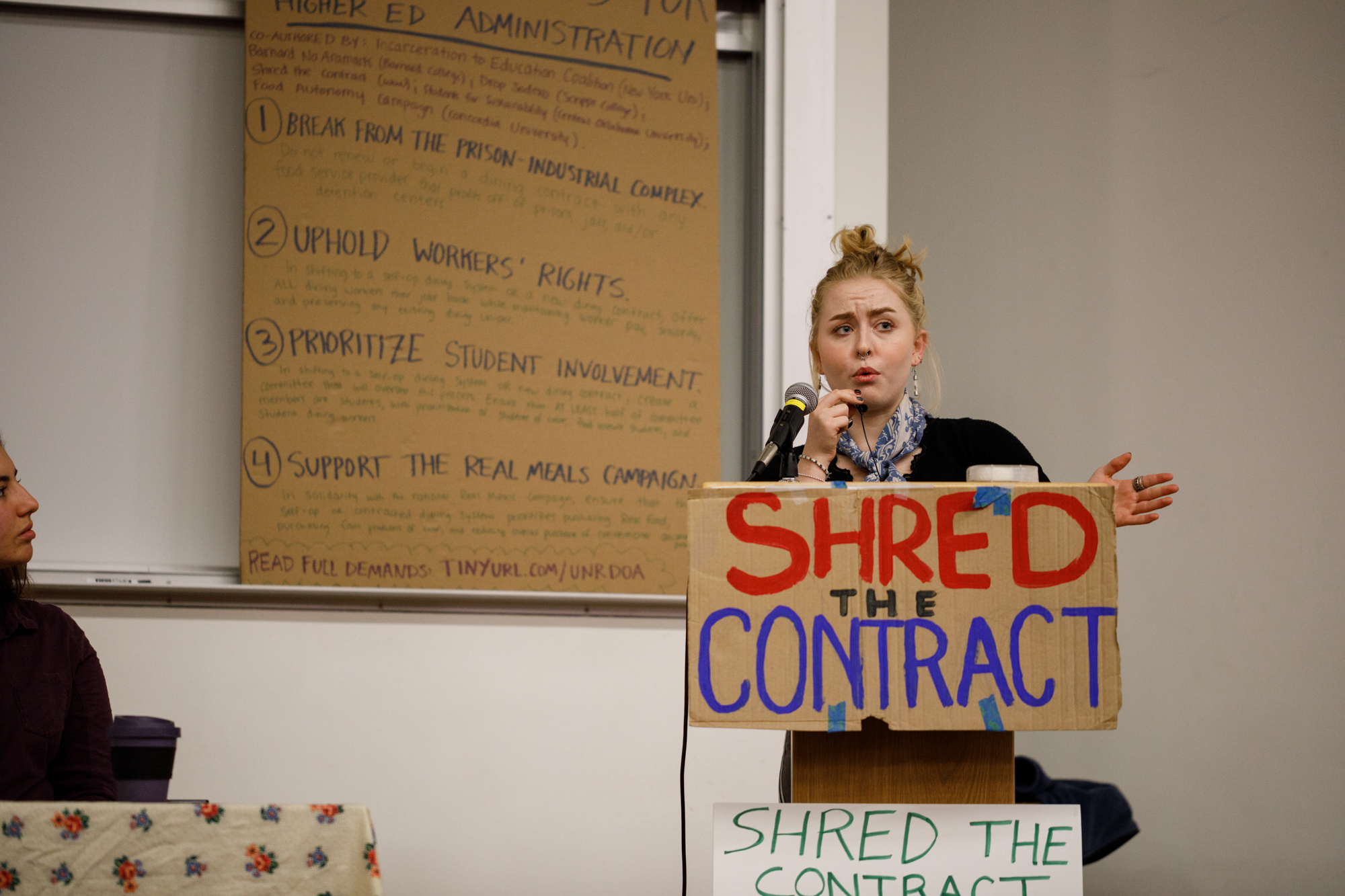Student Sophia Gamble spoke about her personal experiences while living on campus with a meal plan she could not use. Joe Addison // AS Review
By Jack Taylor
From the dining halls to Miller Market, Aramark Corp. has influence on what students eat on campus. Whether it is the bagels at Zoe’s Bookside Bagels or snacks in Miller Market, Aramark is the sole provider of food on campus. This is a fact that the Shred the Contract club seeks to change.
Shred the Contact hosted a Food Justice Forum on Nov. 20 where students spoke on any issues they have with Aramark. The group invited Western’s administration to attend the meeting, with seats saved for President Sabah Randhawa, Vice President of Enrollment and Student Services Melynda Huskey and Director of University Residences Leonard Jones, yet the trio did not show.

Grace LaMonte, a member of Shred the Contract, spoke about how if the administration actually wanted to have an open, genuine dialogue about food on campus, that they should want to attend the public forum.
“We told admin. about this event months in advance, we have their seats right there, and they decided to not show up but we still think it’s important to have this conversation,” LaMonte said.
In an email interview, Huskey explained why she and Randhawa were absent from the forum.
“Unfortunately both Sabah [Randhawa] and I were unavailable that evening, I had a previous appointment, and he was in Olympia meeting with legislators,” Huskey wrote.
Huskey also wrote that she is willing to meet with anyone to discuss the future of dining at Western.
“I’m always glad to meet with students, individually or with clubs or other groups,” Huskey wrote.
In a Western Today article, Randhawa gave his official comments on the state of dining at Western.
“As we prepare for the future of dining at Western, we will be looking for input from everyone who eats on campus about what matters most to them in food service, from cost to flavor, sustainable sourcing to social justice,” Randhawa wrote.
The administration did offer to have a closed-door meeting with members of Shred the Contract, but the club believes all students should have access to the discussion since the contract expires in 2021 according to LaMonte.
LaMonte spoke about the importance of the forum.
“Shred the Contract was invited to a meeting to meet with the VP of Aramark, this was a closed-door meeting,” LaMonte said. “It was inaccessible, and they only invited a couple people and it was a pretty blatant PR [public relations] move on their part.”
Karen Cutler, the vice president of Aramark, wrote in an email response about Aramark’s relationship with Western.
“As a proud partner with WWU and an employer of 450 students on campus, we support the values of the University which is reflective in many of our commitments that contribute to a sustainable campus community,” Cutler wrote.

Students from different walks of life spoke at the forum about how Aramark has impacted their time at Western. Sofia Gamble, the president of Western’s chronic illness awareness club, spoke about how challenging it can be for students with dietary restrictions to eat food on campus.
Having chronic lyme disease for the past five years, Gamble follows a strict diet and said that living on campus only increased her stress.
“One thing that was really hard for me last quarter when I was living on campus was the fact that I was paying for a dining plan that I legitimately could not use,” Gamble said.
Gamble elaborated that for her, food has to be 100% organic. Instead, the dining only has one organic vegetable that changes each week. Initially, Gamble worked with Aramark employees but Gamble believes the system wasn’t open to her.
“I could text the chef two hours before I was going to be at the dining hall and they would have a plate prepared for me of unseasoned chicken breast and whatever their organic vegetable of choice was that week,” Gamble said.
Ultimately, Gamble hopes that people with dietary restrictions are included in the conversation about dining.
“I just want to make sure that people with dietary issues are represented in a food system, especially at a school where there seems to be a wanted commitment to helping students of all abilities,” Gamble said.
Alongside students who purchase food on campus, former Aramark employees also spoke during the forum. Eve Rivera, who was a full-time employee before becoming a student, spoke on her experience with Aramark as her employer.

Rivera worked for Aramark for two years as a shift lead and later as a store manager. Rivera noted how being a full-time union employee guaranteed her pay raises and other benefits that student employees don’t get.
“Even with these supposed benefits though, my time at Aramark was filled with a lot of stress, pain and conflict and pretty much just constantly feeling like my voice was never going to be heard,” Rivera said.
One of the main contributors to the stress, according to Rivera, was the constant overhead pressure to cut costs and corners. Another contributor to the stress was a high turnover rate, which led to constant retraining of staff, Rivera said.
“I really did try my best but it’s one thing to be under this corporate grasp, but it’s also another thing to have to be the person to enforce those rules,” Rivera said.
Rivera’s biggest problem with Aramark was its decentralization of communication.
“There was plenty of berating emails and phone calls and messages sent through other people that I received from upper management, but they rarely ever came to my store for a direct one-on-one in person communication, which is how things are done effectively,” Rivera said.
Shred the Contract wants to continue to hear from students about what students want to see changed in the dining system.
More information on Shred the Contract, can be found on their Facebook.

